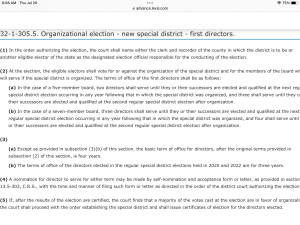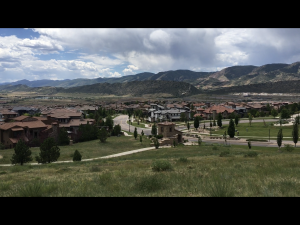To be sure, until 2018, the Lakewood City Council, like most Colorado cities and counties, depended exclusively upon the developer for all their information and advice on metro districts.
As we can see from the Staff Report by the Lakewood City staff, they are still relying upon Cardel for their information about metro districts.
In addition to simply parroting what Cardel has told them, they have also accepted without critical evaluation two important points (among many others):
- Timing
- Financial.
The staff repeat the developer’s misstatement that they have to get approval of the metro district NOW to meet the statutory deadline for the organizational election in November.
There is no statutory deadline for an organizational election. Its whenever the Court says it is. CRS 1-13.5-111(3) and CRS 32-1-305.5.
Here are the details:
From the staff report, parroting the developer:
“The applicant is requesting approval of the proposed Service Plan so the proposed District may proceed to an organizational election. State statute limits the opportunities for district organizing elections and proscribes timelines and steps necessary to create a district including public notices, governing authority action, district court action and an election. Given those statutory schedule constraints, the applicant requested City Council approval of the Service Plan on July 24, 2023 or the district election will, by statute be deferred 12 months.” (Bold emphasis addded)
There are two separate elections involved. One is the organizational election which the staff references in their report.
The organizational election is the election to “vote” to create the district and “vote” for the first board of directors. The only voters of course are the developer, his employees or family. Usually about 1 to 8 people.
Pursuant to the statute – that can be done at any time – it’s set by the Court. Whatever date the court sets is the date for the organizational election. CRS 1-13.5-111(3)
This is the only election necessary to create the district.
What the developer didn’t tell the staff is the election they really care about and is not the organizational election, is the TABOR BALLOT ISSUE ELECTION where the developer and his employees and family members, who will never live there or pay taxes
- “vote” to eliminate the right of future residents to vote on taxes and issuing bond debt – as required by TABOR,
- “vote” to impose 18% interest on bond debt,
- “vote” to increase the debt authority in the service plan, usually 10 times.
The TABOR election does have very restrictive deadlines and dates. Why. Because it is a critical vote of the taxpaying residents on matters regarding their taxes. Those elections are held when people are usually voting on state and federal elections. If held on any date the court decides, many people would not know about it or come to the polls.
Developers, like Cardel here, combine the organizational election with a TABOR ballot issue election because they want to take away the residents’ rights and increase their financial limits . . . . before the residents arrive.
Because odds are, the residents would not vote
- to give all the power
- to set their taxes and issue debt
- against the residents
- to the developer
- with no oversight.
THATS the big hurry here. It’s because Cardel wants to have a TABOR election without the residents and before they come . . . because the residents would never vote to do it.
And Cardel doesn’t want the city council or the current residents to know what they are doing. Otherwise they would submit the ballot issues as part of the application.
- The ballot issues taking away the future residents’ right to vote on taxes and issuing bond debt
- The ballot issue increasing the debt authority
- The ballot issue setting 18% as the maximum interest rate
Here are the statutes:
CRS 32-1-305.5 Organizational election – says nothing about a separate TABOR election.

CRS 1-13.5-111 Provides the schedule for types of events. A regular election, a special election, an organizational election and a ballot issue (TABOR) election:

“1-13.5-111. Time for holding elections for special districts – type of election – manner of election – notice.”
Here is the section that applies to the ORGANIZATIONAL ELECTION pursuant to article 1 of title 32 above:
” (3) Any special district election ordered pursuant to article 1 of title 32, C.R.S., by the district court having jurisdiction over such existing or proposed special district must be held on the date ordered by the court and conducted in accordance with this article.”
Here are the provisions that apply to the other types of elections, including the ballot issue (TABOR) election, not the organizational election:
A TABOR election is a ballot issue election. As noted in the last sentence above, an organizational election is different and separate from a ballot issue election.
So, pursuant to CRS 32-1-305.5 and CRS 1-13.5-111(3), the organizational election is set whenever the Court sets it and there is no immediate or future deadline.
And the TABOR ballot issue election should wait until the residents arrive.
Financial:
The financial question the staff must ask and Cardel must answer is: how much will Cardel make on the sale of the developed lots and where will that money go.
Title 32-1-203 requires that the developer show there is a “need” for a district.
The staff parrots the developer’s rationalization saying (in regular type) there is no infrastructure. Responses are in bold:
“City staff has confirmed that sufficient infrastructure does not currently exist to accommodate the proposed project.
Infrastructure never exists before the land is developed. Thats nonsensical. Thats why we have developers and how developers make money. They turn raw land with rattlesnakes and prairie dogs like this:

Into this:

By building roads and putting pipes in the ground like this:

Since when did a city or county ever do this (above) for residential development (not in my lifetime in three other states) and if they did, why have developers.
Before 1981 developers did this without metro districts. Even after the current metro district law was passed, developer still do this without metro districts. The city or county never did this – build roads and put pipes in the ground for a residential development – in modern times.
“For the project to proceed, sewer facilities, water facilities, storm water drainage facilities, streets and other infrastructure are necessary and required.”
Emphasizing that sewer is an essential service and Cardel won’t be putting in sewer so the application must be denied (CRS 32-1-203(2) )
“The City will not be constructing the infrastructure necessary to accommodate the project, nor will any other existing governmental entity.”
The city or county never did put the pipes in the ground for new residential developments and if they ever did they would put developers out of business – just need homebuilders to put the homes on top of the pipes in the ground like this:

“The developer is proposing the District as the entity to finance and construct a portion of the necessary project infrastructure.”
No. As the developer’s presentation emphasizes THE DEVELOPER is the one who has the contractual relationship with the city regarding zoning, site plans and approvals to develop the land NOT THE DISTRICT. He constructs. District issues bonds to pay him back, in theory.
The developer said in their materials the district will “finance the construction”. The staff wrote it as “finance and construct.”
The district, as stated in the service plan, is there to REPAY the developer for the cost of building the roads and putting the pipes in the ground – infrastructure to then build the houses. The district is not created to build the development – that is still the developer’s job. The district repays the developer for his costs of putting the pipes in the ground.
“The applicant has indicated that the District is, in part, necessary as a result of the extraordinary infrastructure costs associated with development in the area that has historically been vacant with some residential development to the northeast and to the south.”
Nothing extraordinary about the infrastructure costs. And the land has been vacant because Cardel chose to sue Green Mountain instead of getting sewer from Mt. Carbon – which is the district for Rooney Valley (not Green Mountain) JUST LIKE LENNAR DID in the RRC development next door abutting Cardel’s development to the south.
And none of this has anything to do with how to repay the developer – cost of the developed lot paid for through the cost of the developed lot or through metro district bonds with two layers of interest issued by the developer with no oversight.
The staff is spinning the same smoke and mirrors provided by the developer.
There is no “need” for a district.
The developer can recover his costs the traditional way – include the cost of the infrastructure in the cost of the home and residents can decide for themselves how to pay for it.
(And as we found in Solterra developers still do that – and charge twice for the same cost of the infrastructure).
Again:
The question the staff must ask and Cardel must answer is: how much will Cardel make on the sale of the developed lots and where will that money go.
